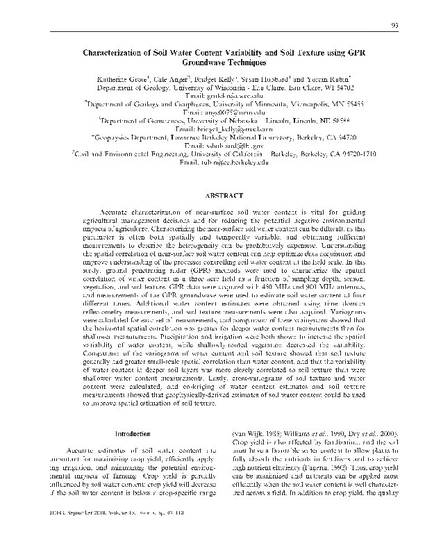
Accurate characterization of near-surface soil water content is vital for guiding agricultural management decisions and for reducing the potential negative environmental impacts of agriculture. Characterizing the near-surface soil water content can be difficult, as this parameter is often both spatially and temporally variable, and obtaining sufficient measurements to describe the heterogeneity can be prohibitively expensive. Understanding the spatial correlation of near-surface soil water content can help optimize data acquisition and improve understanding of the processes controlling soil water content at the field scale. In this study, ground penetrating radar (GPR) methods were used to characterize the spatial correlation of water content in a three acre field as a function of sampling depth, season, vegetation, and soil texture. GPR data were acquired with 450 MHz and 900 MHz antennas, and measurements of the GPR groundwave were used to estimate soil water content at four different times. Additional water content estimates were obtained using time domain reflectometry measurements, and soil texture measurements were also acquired. Variograms were calculated for each set of measurements, and comparison of these variograms showed that the horizontal spatial correlation was greater for deeper water content measurements than for shallower measurements. Precipitation and irrigation were both shown to increase the spatial variability of water content, while shallowly-rooted vegetation decreased the variability. Comparison of the variograms of water content and soil texture showed that soil texture generally had greater small-scale spatial correlation than water content, and that the variability of water content in deeper soil layers was more closely correlated to soil texture than were shallower water content measurements. Lastly, cross-variograms of soil texture and water content were calculated, and co-kriging of water content estimates and soil texture measurements showed that geophysically-derived estimates of soil water content could be used to improve spatial estimation of soil texture.
- 900 MHz,
- Agricultural management,
- Co-Kriging,
- Field scale,
- Ground penetrating radars,
- Near-surface,
- Shallower water,
- Soil layer,
- Soil textures,
- Soil water content,
- Spatial correlations,
- Spatial estimation,
- Spatial variability,
- Time Domain Reflectometry,
- Variograms,
- Water content estimates,
- Water content measurements,
- Environmental impact,
- Measurements,
- Soil moisture,
- Textures,
- Time domain analysis,
- Underwater soils,
- Vegetation
Available at: http://works.bepress.com/katherine-grote/4/
